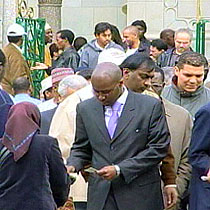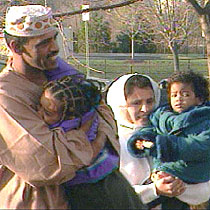-
(单词翻译:双击或拖选)
Washington
07 May 2007
A recent symposium1 in Washington, D.C. examined "What does it mean to be Muslim in America?" Georgetown University's Center for Muslim-Christian Understanding hosted the event, along with On Faith, an interactive2 conversation on religion sponsored by Newsweek magazine and The Washington Post newspaper. VOA's Mohamed Elshinnawi has more.
 |
"I do not really know a lot about Muslims,” admitted one woman. I can't claim to know a lot. I do not know what they believe in or the tenets of their religion."
A man on the street felt, "I am scared of it to be honest with you, it brings a little bit of fear to me after being here 9/11."
Another woman said, "To a certain extent, it seems like an aggressive culture."
Reporter Sally Quinn, a symposium panelist, admits that she has heard many such misconceptions about Islam in America. "I began to see how difficult it is to be a Muslim in this world, particularly to be a Muslim in the U.S. because I know that what we see in the papers and the actions of the few do not represent the tenets of the Muslim faith. There are still a lot of negative perceptions there." Quinn says these perceptions are formed because most Americans know very little about Islam.
But Hadia Mubarak, a senior researcher at Georgetown Center for Muslim-Christian Understanding and the president of the National Muslim Student Association offers another explanation.
"I think the problem is that people are looking at the current tension between the U.S and the Muslim world through the lenses or the prism of religion when it really has nothing to do with Islam whatsoever4."
Mubarak argues that certain political, socio-economic and historical grievances5 in much of the Muslim world are what really fuel anti-Americanism.
Ingrid Mattson, president of the Islamic Society of North America and Professor of Islamic studies at Hartford Seminary in Connecticut, agrees. She adds that sensational6 media coverage7 that dwells on Muslim violence fuels anti-Muslim sentiment in the West. "The media need to represent Muslims better, to clarify the reality of the position that those people who are extremists, who are doing acts of violence are marginal."
 |
| Muslim family |
"We are working hard and we are fortunate in having so many partners, especially in the interfaith community,” says Mattson. “Christian organizations, Jewish organizations, interfaith organizations, who want to help us by educating their members to understand Islam and not be intolerant towards us."
Muslim American businessmen also launched Bridges TV, a 24-hour cable channel to explain Islam and educate the public about their Muslim neighbors.
Imam Yahya Hendi, the Muslim Chaplain at Georgetown University, says that American Muslims should also assert themselves as an integral part of the American society: "We are here to stay, there are seven million Muslim Americans and this is our country. For me what does it mean to be Muslim American is to be loyal to our country, America, to our values as Americans but also to be loyal to our values of Islam."
Hadia Mubarak says with more understanding of what Islam is all about, the American public will be more comfortable with Muslim Americans. "In fact there is nothing about Islam that makes it incompatible10 with western democracy or western values of human rights and gender11 equality and everything that we value as Americans."
Salman Ahmad is a Pakistani-American rock musician. He says that Muslim Americans can use Islamic art, poetry and music as a cultural bridge to humanize their identity.
"The Sufi music that comes out from the sub-continent and from Persia is a heritage from Muslims who rediscovered their own identity, and also as a way to build a bridge between the Muslim world, the West and America," says Ahmad.
He says modern music can be a vehicle for bridging the ancient gap between Islam and the West.
 收听单词发音
收听单词发音
1
symposium

|
|
| n.讨论会,专题报告会;专题论文集 | |
参考例句: |
|
|
|
2
interactive

|
|
| adj.相互作用的,互相影响的,(电脑)交互的 | |
参考例句: |
|
|
|
3
formulating

|
|
| v.构想出( formulate的现在分词 );规划;确切地阐述;用公式表示 | |
参考例句: |
|
|
|
4
whatsoever

|
|
| adv.(用于否定句中以加强语气)任何;pron.无论什么 | |
参考例句: |
|
|
|
5
grievances

|
|
| n.委屈( grievance的名词复数 );苦衷;不满;牢骚 | |
参考例句: |
|
|
|
6
sensational

|
|
| adj.使人感动的,非常好的,轰动的,耸人听闻的 | |
参考例句: |
|
|
|
7
coverage

|
|
| n.报导,保险范围,保险额,范围,覆盖 | |
参考例句: |
|
|
|
8
mainstream

|
|
| n.(思想或行为的)主流;adj.主流的 | |
参考例句: |
|
|
|
9
militant

|
|
| adj.激进的,好斗的;n.激进分子,斗士 | |
参考例句: |
|
|
|
10
incompatible

|
|
| adj.不相容的,不协调的,不相配的 | |
参考例句: |
|
|
|
11
gender

|
|
| n.(生理上的)性,(名词、代词等的)性 | |
参考例句: |
|
|
|















